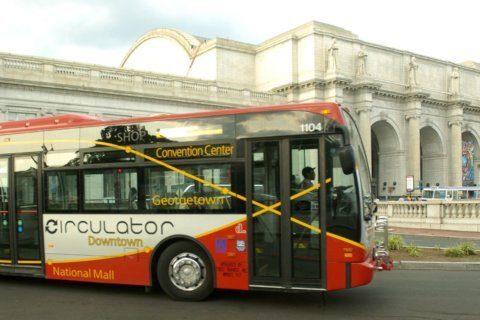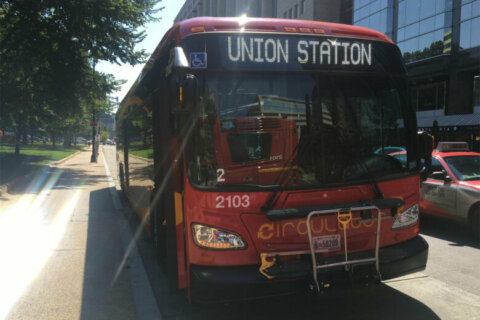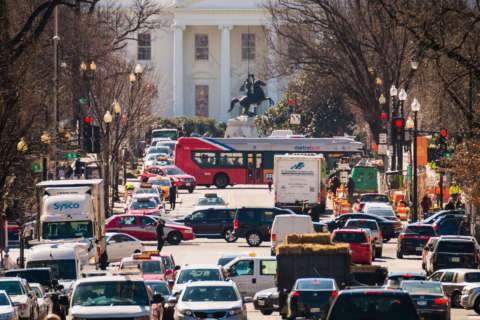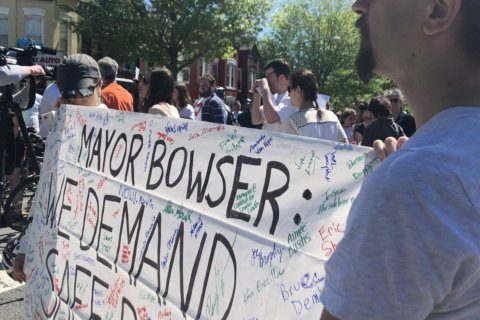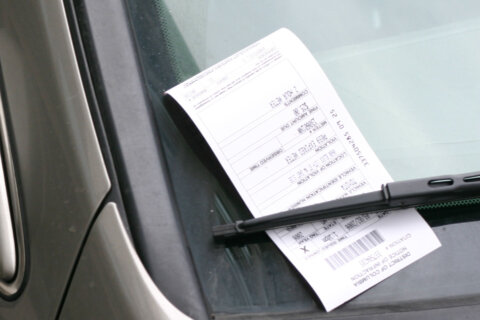Free DC Circulator rides and potential increases in residential parking fees are two issues in a bruising budget battle between Mayor Muriel Bowser and the D.C. Council.
It has spilled into unusual budget sniping on social media, including directly from District government agency accounts.
At a briefing for reporters this week, the mayor’s office highlighted its concerns with council committee recommendations to:
- Keep a $1 fare for Circulator rides;
- Increase residential parking permit fees;
- Raise the city’s soda tax;
- Shift some affordable housing funding for different use than Bowser has proposed;
- Prevent the increase in D.C. police and D.C. jail officers that Bowser had proposed;
- Change violence prevention plans;
- Lay out guidelines and change funding plans for United Medical Center from the mayor’s plans;
- Freeze D.C. government building permits until the administration implements a law regarding short-term rentals such as AirBnB.
The Bowser administration supports a plan to study congestion pricing or tolls in the city.
On Wednesday, the D.C. Council previewed debate on the issues in a daylong session. Initial budget votes will be held next week; final votes will start later this month.
Chairman Phil Mendelson cited a council proposal to raise the tax on sugary drinks from effectively 6% to 8% as an example of what he believes to be unsustainable funding decisions set to be approved.
Bowser proposed increases in taxes on larger commercial property transactions as a way to support increased spending in her budget plan.
“I’m deeply disturbed with what we’re doing with this budget. My sense is that a majority of the members support the increases, and that would speak to the soda tax as well as RPP [Residential Parking Permit fee] as well as the other taxes,” Mendelson said.
“I saw this 20 years ago, 30 years ago, before the control board, where we were raising this tax a little bit and that fee a little bit and this tax a little bit,” he said.
There is some opposition on the council to the soda tax proposed by the Transportation and Environment Committee to fund meals programs for low-income children and families based on the tax increase itself and based on the fact that it was brought up late in the budget process with less opportunity for public input.
Committee Chair Mary Cheh supports the plan.
“This is equity right here. This is helping people, low-income people and poor children, to get them proper nutrition, as opposed to big soda. I know where I stand,” she said.
The Bowser administration calls the increase regressive.
Parking fees
The committee recommended an increase in the cost of a residential parking permit for the first time since 2011 from $35 to $50, and a new stepped increase in the cost for each additional car at the same address.
Cheh said the goal of raising the fee is to discourage people from taking up multiple street parking spaces in their neighborhood and potentially to reduce the number of cars in the city.
The residential parking rules apply on blocks where a majority of households requested it.
“This is not a right that one has, but rather it’s an opportunity, and we can’t, I don’t think, keep talking about congestion and too many cars and not see the connection between the two,” Cheh said.
The Bowser administration opposes the change as a cost increase for residents that could be difficult to implement with current systems, city Administrator Rashad Young said.
“I’d like to think that having three, four, five, six, apparently seven vehicles is not something we would want to encourage in a major city,” Council member Brianne Nadeau said.
“Parking is like the third rail of politics … I think we should do more of this,” she added.
Though Young opposed the fee increases for cars, he said the administration does hope to reduce traffic on the roads through other means.
Free Circulator
The mayor’s office is pushing back hard on the council’s skepticism of free DC Circulator rides.
“It just makes residents pay more for services that they don’t need to pay more for, and is inconsistent with our Vision Zero goals,” Young said. “More people on the bus means less cars on the road.”
Cheh questions whether Young’s assumption is true. It remains unclear whether increases in Circulator ridership in the months that fares have been waived have simply come at the expense of other options, such as Metrobus, trains, walking or biking.
The District Department of Transportation released data Wednesday showing a 37% increase in recorded Circulator ridership in April of this year as compared with April of last year — with 555,708 trips.
“It’s showing quite clearly that it’s effective,” Young said.
Council member Charles Allen, who opposes making the DC Circulator free as part of this budget, wants the support to go to more D.C. residents rather than visitors from out of town.
“We should be thinking about how we look for D.C. residents to be able to take the bus and have a discounted fare because our buses connect our neighborhoods. Our buses connect us to school and to jobs and to the library and to the lives in our communities much more so than the Circulator,” Allen said.
The council’s budget plan still includes funding for bus lanes on K Street NW and to finally advance changes to dangerous “Dave Thomas Circle” at New York and Florida avenues in Northeast D.C.
Congestion pricing
The Bowser administration supports Cheh’s addition of a $475,000 study of congestion pricing or tolling in the District.
“We need to map the problem of congestion and consider remedies, and we need to analyze the potential benefits of implementing congestion pricing for traveling within and into the District,” Cheh said.
New York City is implementing similar plans, in addition to the existing tolls on the city’s bridges, and the District could eventually consider a mix of tolling bridges and charging fees to drive into particular parts of the city.

